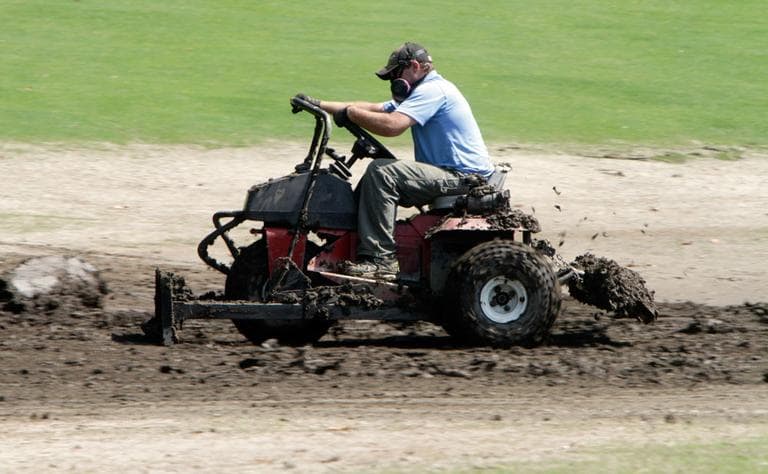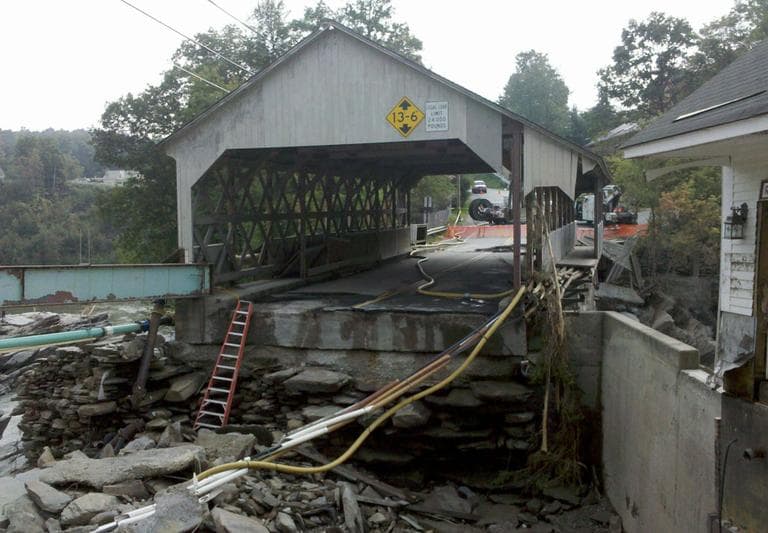Advertisement
Commentary: Viewing Vermont's Flood Damage
It's been nearly two weeks since Tropical Storm Irene blew through New England and caused widespread flooding. But in Vermont, many communities still face the slow, expensive task of rebuilding washed-out roads and bridges. And this week's rain is only making things worse.
Concord, Mass., resident Mike Farber often vacations in Vermont and wanted to check out Irene's aftermath. So he drove up there this week, and was startled by what he saw.
Click to hear Mike's commentary, or read it below.

As I rounded Route 14 towards West Hartland, Vt., I got my first look at the damage.
Involuntarily I muttered, "Jesus." Before this, I’d seen only one major flood in my life, way back in 1972. When I was a 5 year old, Agnes decimated my home area of central Pennsylvania. But now I was looking at flood damage with the clear vision of an adult. And despite seeing pictures online, I was shocked.
It was those pictures and my family's love of Vermont's Upper Valley that brought me north the Sunday of Labor Day weekend. My plan, hatched in a whirlwind 48-hour period, was to collect as many clothes, food and other supplies I could, sherpa them up to Vermont, drop them off, jump in, and spend the rest of the day helping folks dig out.
The plan was working like clockwork. Our community of Concord came together to stuff our car with over 20 bags of supplies.
But it wasn't until I turned that corner that it all became real.
Advertisement
Trees embedded on the pilings of bridges. Cars and playgrounds completely covered in mud. Houses destroyed by water, still standing, but only a shell of themselves.
One of those shells was our destination. The owner told us that the house had never been flooded, wasn’t even in the flood zone. So of course he didn't have flood insurance.

We went in and started grabbing. The job was to collect all the water-logged trash, load it into a truck and take it to the dump. The baseboards, wood, insulation and mud smelled and weighed a ton. But that was easy work. Stuffing personal items like books, pictures and toys into trash bags is truly heartbreaking. A family’s life gathered by strangers and taken to the dump.
The homeowners are my new heroes. They kept their sense of humor and sense of profound thanks even as they grappled with dozens of difficult decisions. We worked on a couple houses; both had been renovated to the studs in the last few months. Now the houses had to be completely rebuilt. Or the homeowners had to get out.
Many hours later, reeking of sweat and other unidentifiable smells, I needed a shower. But first I wanted to visit the village of Queechee, where we've spent countless weeks over the last 10 years and had just visited in August.
The time walking a transformed Quechee Green proved to be a personally tough moment. This formerly splendid area, where we played with our dog, kicked soccer balls with the kids and had epic games of frisbee, was now one big mudflat. The community garden was stripped of all crops, with crayfish laying where tomatoes had flourished two weeks earlier. As I shared a beer later that evening with locals at Firestone's restaurant, it struck me that Irene hit everyone in some way, shape or form. Some of us got lucky and lost power for a couple of hours. Others had their lives changed forever.
This program aired on September 8, 2011. The audio for this program is not available.
